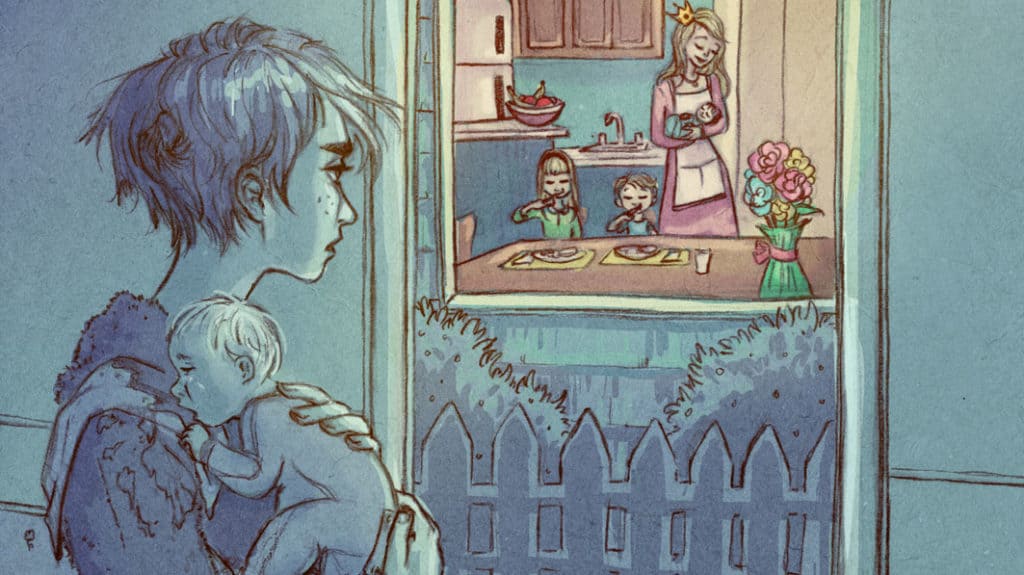
Strong-Willed Women Mothering Strong-Willed Children
If you’re a strong-willed woman, it can be tough to parent a younger version of yourself. But you also have a definite advantage… you know what it’s like to be a strong-willed child.

What would it look like if we loved other Moms, as Jesus loved us, instead of taking out a measuring stick?
I knew a mom who lost all her baby weight quickly, who didn’t have to drop off her son at day care every morning, and who laughed at the easy familiarity of motherhood when it seemed like a strange and scary land to me.
We sat outside in the late afternoon sun before church one evening, and I watched her feed her boy zucchini and potatoes. I watched him eat it while my toddler spit up anything I offered.
She said, as everyone used to, “He’s so tiny. How much does he weigh?” I felt the shame of failing at one more element of this new gig. I quietly resented her and wanted to be her at the same time.
Since then, my husband and I have added two more kids to our family, and I’ve realized I’m not the only mom who feels so inadequate. I see oceans of insecurity all around me. This is the one thing we’re all terrified of getting wrong — how to be someone’s mother. It makes us quick to point fingers at another mom, to keep score, because we need to neutralize our own feelings of failure. The shortest cut is to cut her down to size.
We are moms who are threatened by moms who work outside the home. We are moms who judge moms who work as stay-at-home parents in the home. We are moms who are annoyed by the mom who doesn’t socialize with other moms but concentrates on her smartphone at the park; or we assume that if her kid is difficult, then she must be a bad parent. We are the moms who have worked so hard to be defined by our degrees that we’re offended by the moms who are content without degrees.
Yet the women we’re so offended by bear our name: Mom. And they, too, change diapers, set curfews and engage in the grueling art of saying “no.” Our mommy-measuring jealously finds its mark against other “perfect” moms, and we competitively make comparisons between their lives and our own.
But what if we could see that? What if others’ choices didn’t offend mine? What if together we actually accepted Jesus’ dare in John 15:12 to “love one another as I have loved you”?
What would that look like — to love other moms rather than whipping out measuring sticks and insecurities? Instead of judging with raised eyebrows, pursed lips and hands on hips, what if we focused on being the kind of neighbor everyone would want?
If we really treated others as Jesus did, loving our neighbors as Jesus instructed in Luke 10:30-37, maybe it would look something like this:
It’s the strangest mother instinct — to instantly compare myself and my child to her and her child. Whether I’m standing in line at the bank and the mom ahead of me is holding hands with her child or I’m watching a room full of delicate, 3-year-old ballerinas twirl out of time to music, I am mentally measuring the superior mothering skills of other women, comparing my child to theirs.
We measure each other to see if we measure up. But what if that tug to compare was instead a trigger to encourage? What if we took the extra moment to find something to praise in that other mother sitting across from us at the playground? Authentically building up someone else is the first step to feeling better about ourselves and has the added benefit of helping us start to defuse some of our own insecurities by focusing on someone else’s beauty and not our own inadequacies.
Remember our kids are always watching
When I’m tired and the kids are demanding and I explode with, “I am not your servant,” I shouldn’t be surprised when a week later I hear an older brother respond to a younger brother’s request for help in the same way.
We are walking, talking, living lessons for our kids. And what we love, they may end up loving. But what we judge, they will probably judge. Criticizing other mothers tells our kids it’s OK for them to criticize their friends. Teaching our kids how to serve and how to love their neighbors as themselves — especially when their neighbors don’t look, live or choose the same as they do — starts with how I treat those who don’t live like me. My hope is that one day they will be comfortable in homes that look nothing like the one they grew up in, that they will be quick to love and slow to criticize, because they started practicing early.
For a long time I hid my messes. I was afraid of them and afraid of what people would say. So I just walked around with this ache of insecurity and new-mom panic. I tried to ignore these feelings, politely saying I was “fine” when anyone asked how I was doing — as if this could ease the doubt that was living in me as my 1-year-old went night after sleepless night convincing me I had no business being anyone’s mom.
“Fine” is so dangerous. Fine means the end of a conversation and the beginning of nothing. If the “truth will set you free” (John 8:32), it’s best to start living in it, even when it’s hard to admit our un-fine moments. I’ve found it’s in those moments that people can actually get to us to help us.
The day I admitted to a friend that I was anything but fine was the day I discovered the beginning of real friendship and the ability to start piecing my un-fine bits back together. No mom is exempt from the un-fine days. And rather than pretending they don’t exist, if we are willing to share how we made it through, we’ll help equip each other with the survival skills for managing the next bout of bad days. And we just might gain new friends who will bring over chocolate cake when we’re in the thick of it.
Here’s the thing — other mothers are desperate to know that they’re not alone in their fear of failure, their sleeplessness, their worry that the baby isn’t gaining weight, sleeping through the night yet or walking. But they are equally afraid of admitting that out loud.
If you’re willing to fess up to your own fears, you open the door for others to be freed from the isolation of the awful lie that “I’m the only one who ever felt this way.”
You give them a gift when you go first — the possibility of community and solidarity. You give them the gift of transparency and acceptance. You lift a load off their shoulders when you open up with your own stories of failure, like when your son told his kindergarten teacher about the time you lost your temper and told him to “shut up, already.”
Years after I was a first-time mom; years after I’d said goodbye to my pre-mom jeans and adapted to a perpetual state of sleep-deprivation; years after having my third baby — one night an email arrived in my inbox. It was from the mom I used to measure and re-measure and complain about.
The perfect mom with her perfect son and her perfect waistline — that I could never live up to — admitted that she’d once felt just as lost as I had. Her heart had been as lonely as mine in those first years of motherhood. Her story that felt miles away from mine sidled up to say that we’d been in it together all along. We just didn’t know.
We were both so focused on the how-tos that we forgot the me-toos. We missed the freedom of admitting to our struggles and the relief of saying, “Me, too.”
And just like that, the boundary line between us was erased. Or rather, she stepped over it, and it got scuffed up by our footprints, our messes, our very different choices — as we walked right into the middle of a shared story.
Copyright © 2015 by Lisa-Jo Baker. Used by permission.





Lisa-Jo Baker is a blogger, a public speaker and the author of Surprised by Motherhood: Everything I Never Expected About Being a Mom. She is also the social media manager for the DaySpring Christian card company and the community manager for DaySpring’s (in)courage.me website which offers encouragement to millions of women around the world. Lisa-Jo and her husband have three children and live near Washington, D.C. Learn more about Lisa-Jo by visiting her blog/website: www.lisajobaker.com.

If you’re a strong-willed woman, it can be tough to parent a younger version of yourself. But you also have a definite advantage… you know what it’s like to be a strong-willed child.

Navigating an adoptive mother’s heart is an emotional journey. Regardless of whether the foster-to-adopt child has contact with their birth family, the mother’s heart will

It can be hard to know what to think when going through miscarriage. Fortunately, God wants to bring comfort through His Word.